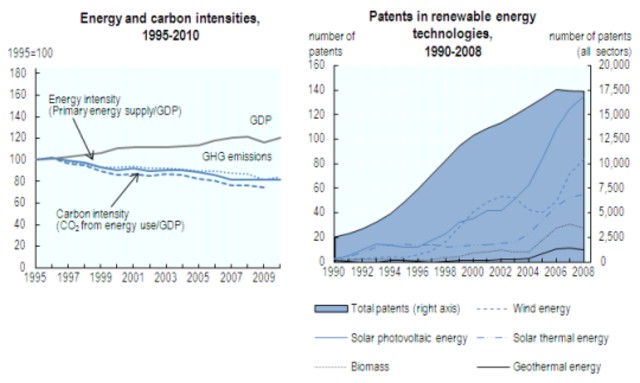Germany: a laboratory for green growth
 Germany has been a trend setter in terms of harnessing renewable energy resources to power its industries and in successfully limiting the amount of carbon, energy and resources required to grow its economy.
Germany has been a trend setter in terms of harnessing renewable energy resources to power its industries and in successfully limiting the amount of carbon, energy and resources required to grow its economy.Though the public is generally satisfied with the level of environmental quality, the latest OECD’s Environmental Performance Review of Germany warns that challenges remain in areas like air and water quality, the protection of biodiversity, and de-carbonising energy production.
It says that Germany will need more cost-effective policies to achieve its ambitious environmental objectives which, in some cases, go beyond those established in the European Union.
OECD Environment Director, Simon Upton said, “Today’s massive environmental challenges demand cost-effective solutions that promote innovation and avoid technological lock-in. New sources of green growth can play an important part in the recovery from the current economic and financial crisis. In this, Germany is leading the way.”
Key environmental trends
During the 2000s, Germany performed well on many economic and social indicators and continued to improve its overall environmental performance. This report presents a snapshot of Germany’s progress and challenges in:
•Reducing the carbon, energy and resource intensities of its economy.
•Managing its natural asset base.
•Improving the environmental quality of life.
Policy-making environment
Since 2000, Germany has consolidated and further developed what was already an ambitious environmental policy framework. There has been a shift from sector-specific to more comprehensive, cross-cutting policies. The issues examined include:
•The key environmental and sustainable development initiatives.
•The institutional framework for environmental and sustainable development policies.
•The mechanisms to promote active public participation.
Towards green growth
Germany has made major progress in establishing an environmental policy framework that supports green growth. The use of economic instruments has been extended and a competitive environmental goods and services sector has emerged. Discussed is Germany’s progress in:
•Greening the tax system.
•Removing environmentally perverse incentives.
•Extending the use of pricing mechanisms.
•Ensuring a consistent regulatory framework.
•Investing in the environment to promote economic growth.
•Promoting the environmental goods and services sector.
•Mainstreaming the environment in trade and development.

Environmental innovation
A strong national innovation framework, a broad industrial base, a high level of participation in international trade, and strict environmental regulations have underpinned Germany’s environmental innovation performance. The issues reviewed include:
•The role of technological innovation in German environmental policy.
•Environmental policy instruments to foster innovation.
•Policies to promote renewable energy, including feed-in tariffs.
•General innovation policy.
Climate change
Germany is a front-runner in developing solutions to address the challenge of climate change. It managed to considerably reduce domestic greenhouse gas (GHG) emissions over the 2000s and set ambitious emission reduction targets to 2020 and beyond. The report analyses Germany’s GHG emission performance and reviews:
•The policy-making framework.
•The instruments in place for pricing carbon.
•The policies that promote renewable energy and energy efficiency.
•The policies and measures in the transport sector.
•Climate policy objectives after 2012.
The OECD report presents 29 recommendations including:
•Strengthen assessment of the impact of economic policies on the environment and the impact of environment-related policies on the economy.
•Design financial support for ‘green’ innovation to encourage private investment capital.
•Systematically assess the environmental impact of subsidies, with a view to phasing out those that are environmentally harmful and economically and socially inefficient. This includes adjusting subsidies for renewable energies.
•Tax energy in sectors not covered by the EU Emissions Trading System and provide a consistent carbon price signal across the economy.
You can return to the main Market News page, or press the Back button on your browser.

